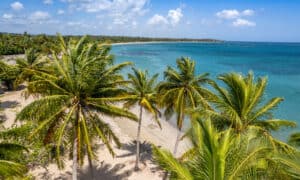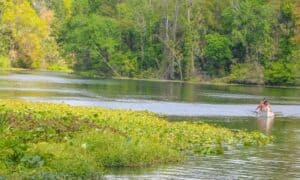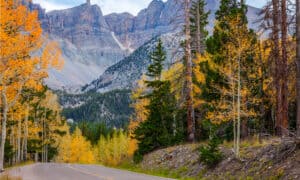Suppose you’re a lover of great adventures and fancy yourself a bit of a discoverer. In that case, you will want to know about the most popular national parks in the United States – from habitats with unique natural wonders to spectacular terrain and icy glaciers.
A visit to national parks offers an excellent opportunity to find solace and inspiration in a natural environment. They are an oasis amidst concrete jungles, with majestic animals, stunning scenery, jungle bridges, and nature trails.
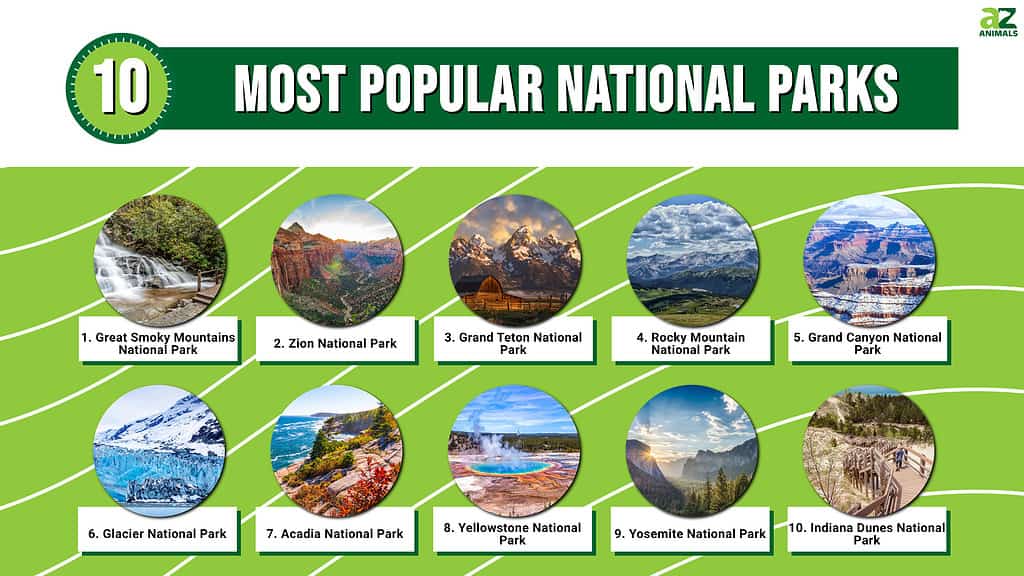
Choosing which natural wonders to visit is challenging, with 423 parks in the National Park System. To help, the National Park Service compiled a list of the most popular national parks using expert insights and reader votes, as well as factors like breathtaking natural landmarks and accessibility.
This article will look at the 10 most famous national parks that are perfect for relaxing your mind and getting close to nature. Read on to discover when it’s the best time to visit to avoid crowds.
1. Great Smoky Mountains National Park
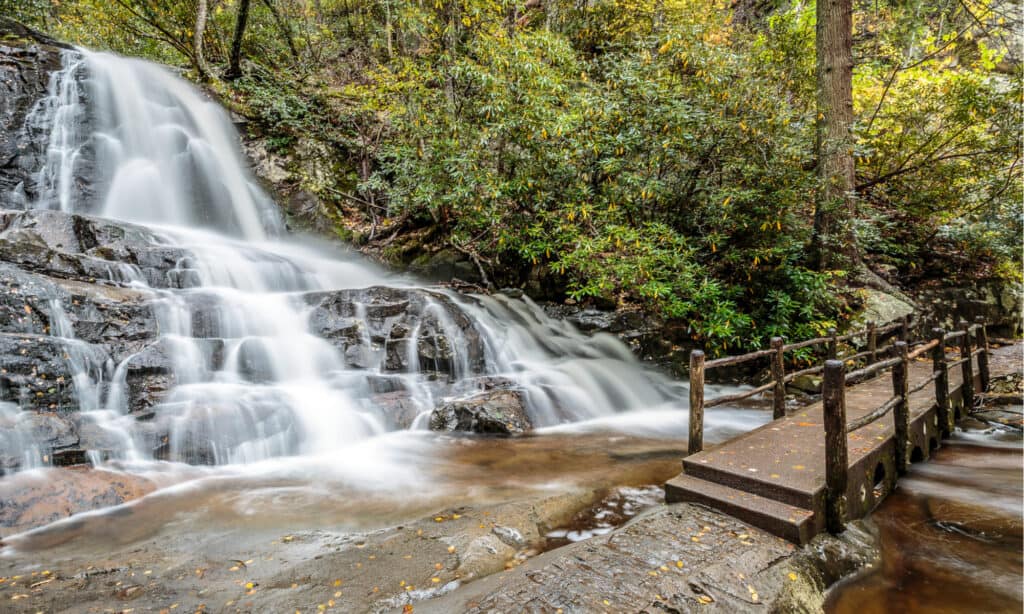
Great Smoky Mountains National Park offers stunning views of waterfalls, streams, rivers, and wildlife.
©Weidman Photography/Shutterstock.com
| Great Smoky Mountains National Park | |
|---|---|
| Location | North Carolina and Tennessee |
| Size | 522,427 acres |
| Animals to See | Black Bear, salamanders, elks, coyotes, and white-tail deer |
| Attractions to See | Clingman’s Dome and the Appalachian Trail |
Want to stroll along the meandering paths or hike into the forest trails to soak in the serenity and lush greenery? The Great Smoky Mountains National Park is a perfect choice to steal a few hours in a sprawling landscape that’s surrounded by lush forest and an abundance of wildflowers that bloom year-round.
The park offers stunning views of waterfalls, streams, rivers, and wildlife. Summer and fall are the best times to visit the park, though July is the busiest month of the summer season, while October is less crowded.
2. Zion National Park
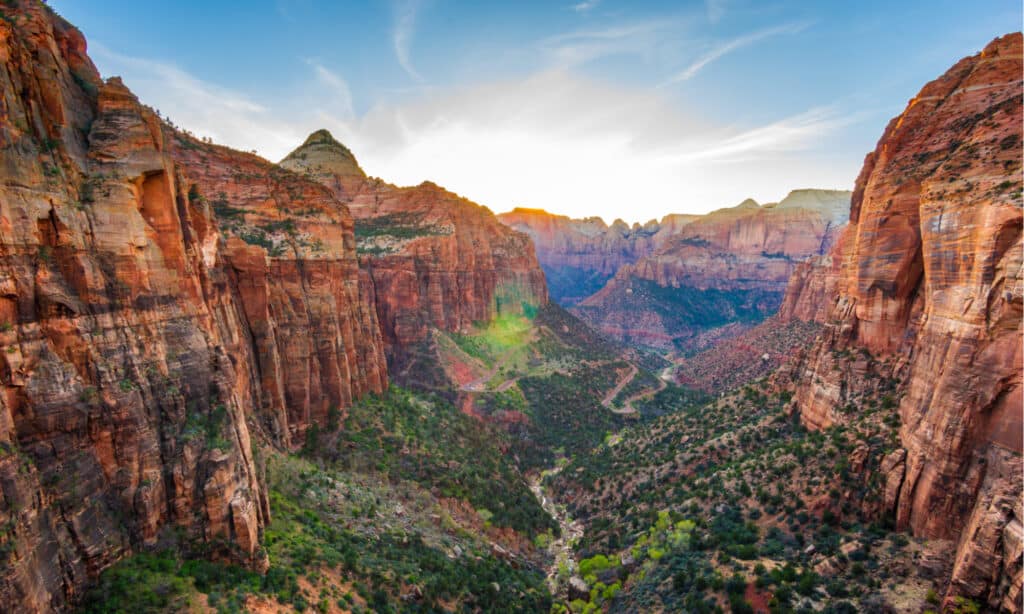
Zion National Park is a haven for nature lovers due to its rich biodiversity and thriving ecosystems.
©Asif Islam/Shutterstock.com
| Zion National Park | |
|---|---|
| Location | Southwest Utah |
| Size | 146,597 acres |
| Animals to See | Mountain lions, rock squirrels, bighorn sheep, foxes, and mule deer |
| Attractions to See | Virgin River, Steep Red Cliffs, Emerald Pools, Angels Landing, and the Observation Point |
Zion National Park is a haven for nature lovers due to its rich biodiversity and thriving ecosystems. The place is covered with steep red cliffs, making it one of the best parks to unravel the mysteries of nature. The park is less crowded between December and April, allowing you to enjoy the spectacular vistas in the fresh, crisp winter air.
The expansive canyon is the highlight of the park. It’s around 2,000 ft deep and offers hikers an opportunity to explore its floors, also known as “The Narrows.” Visitors are permitted to swim in the Virgin River.
3. Grand Teton National Park
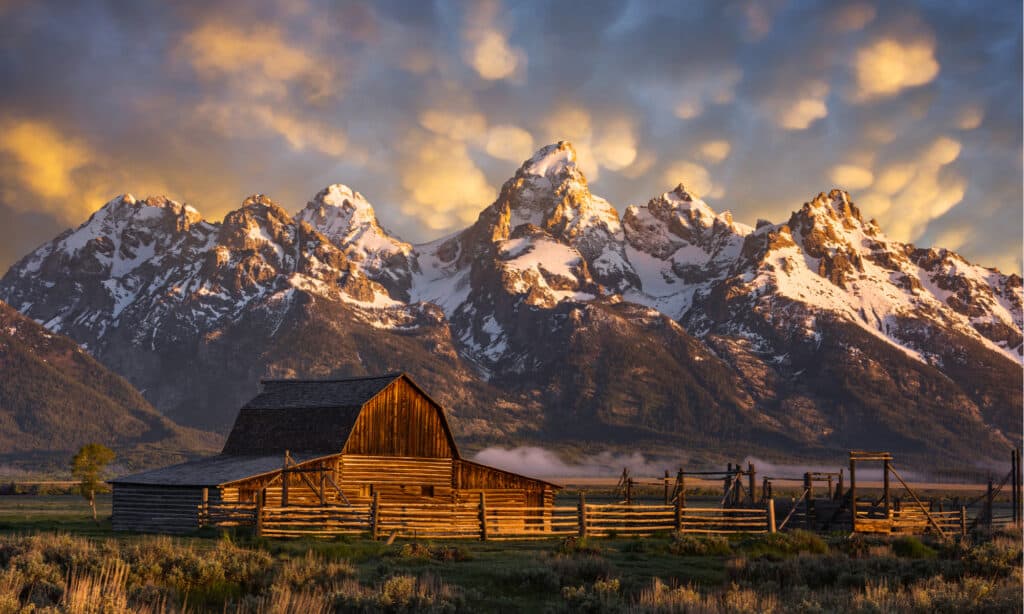
Grand Teton National Park is home to moose, bison, black bears, elk, grizzly bears, and pronghorns.
©anthony heflin/Shutterstock.com
| Grand Teton National Park | |
|---|---|
| Location | Wyoming |
| Size | 310,000 acres |
| Animals to See | Moose, bison, black bears, elk, grizzly bears, pronghorn |
| Attractions to See | Snake River Overlook, Moose Wilson Road, Schwabacher Landing, Jenny Lake Trail, Signal Mountain, and the Hidden Falls |
Grand Teton National Park is among the best places to visit if you want the freedom to take more rugged trails. Float the Snake River and explore hundreds of miles of trails along the mountains that led to the park’s creation. Rising above a scene rich with pristine lakes, breathtaking alpine terrain, and unique wildlife, the park stands as a monument to the people who fought to protect it.
Fall is the best time to visit the park. It’s less crowded, and all park activities are open and accessible. You will also be able to see how the fall season brings out a burst of bright colors and enjoy the quiet of this amazing place.
4. Rocky Mountain National Park
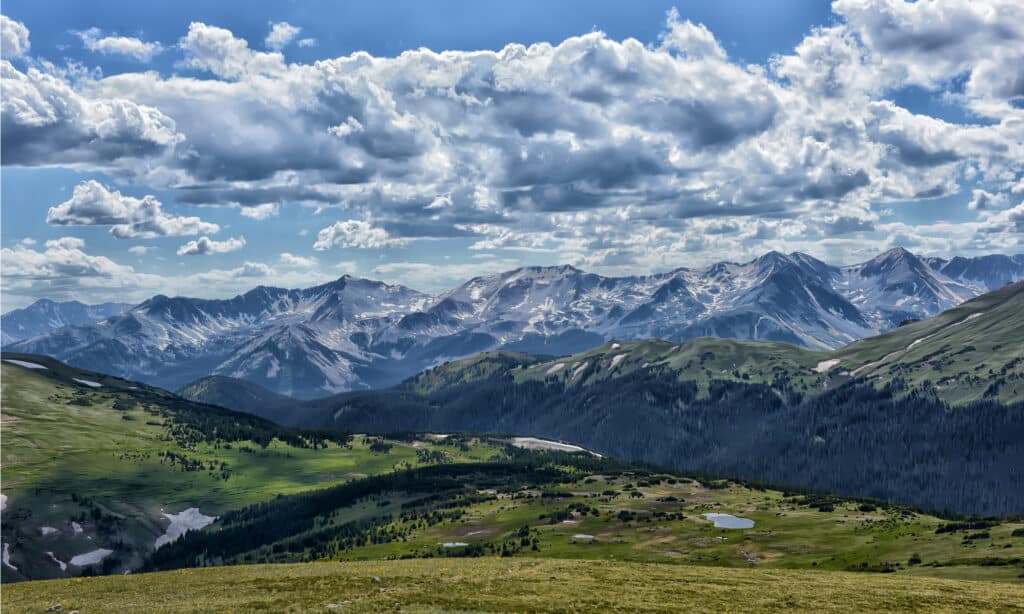
Rocky Mountain National Park is one of the most visited parks in the country.
©Anna Krivitskaya/Shutterstock.com
| Rocky Mountain National Park | |
|---|---|
| Location | Colorado |
| Size | 265,461 acres |
| Animals to See | Mountain lions, coyotes, bobcats, deer, pikas, marmots, elks, and bighorn sheep |
| Attractions to See | Bear Lake, Longs Peak, Sprague Lake, Alberta Falls, and Dream Lake |
World-renowned for its gorgeous scenery, Rocky Mountain National Park is one of the most visited parks in the country. Make sure you hike or drive through the famous Old Fall River Road and Trail Ridge Road and get stunning views of the park from the overlooks.
Many people visit the park between June and September when the snow has already melted, and the hiking trails and attractions are also accessible. It’s also less crowded during these months. Many trails are accessible by snowshoes during the winter.
5. Grand Canyon National Park
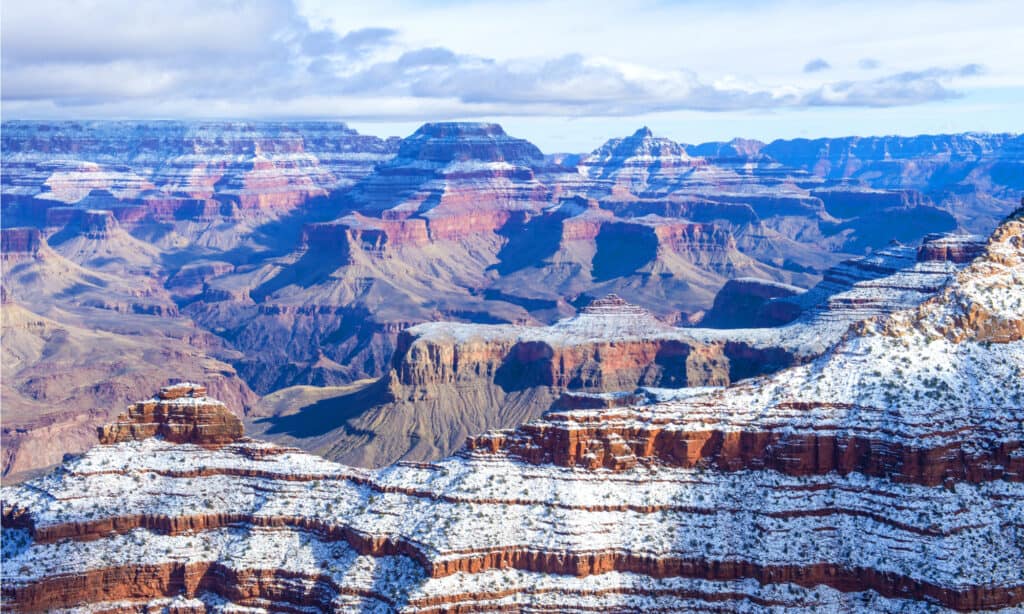
Grand Canyon National Park is located in Arizona.
©Kobby Dagan/Shutterstock.com
| Grand Canyon National Park | |
|---|---|
| Location | Arizona |
| Size | 1,218,375 acres |
| Animals to See | Mountain lions, desert bighorn sheep, mule deer, gray foxes, and coyotes |
| Attractions to See | Mather Point Overlook, Havasu Falls, South Rim Trail, Grand Canyon Railway, and Yavapai Observation Station |
The Grand Canyon National Park is, without a doubt, the most popular national park in the country. It’s home to the immense Grand Canyon, with its layered red rock formations that reveal millions of years of geological history.
You will discover a lot of fantastic vistas and a protected natural environment during your canyon visit. The park is extremely crowded in June when schools close, so plan your visit before then if possible.
6. Glacier National Park
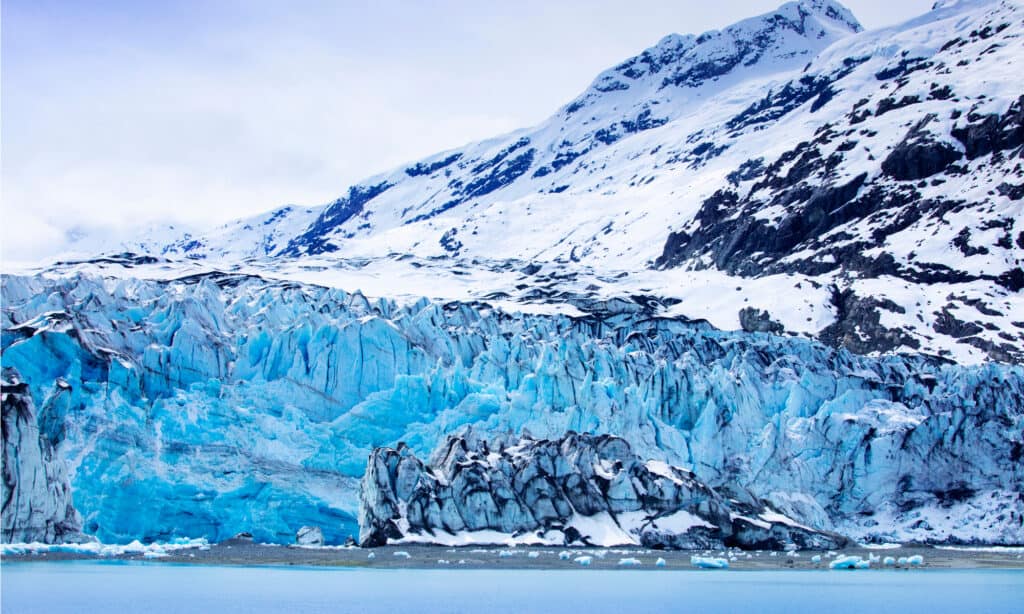
Glacier National Park is home to spectacular lakes and alpine meadows.
©wu hsoung/Shutterstock.com
| Glacier National Park | |
|---|---|
| Location | Montana |
| Size | 1,013,322 acres |
| Animals to See | Grizzly bears, coyotes, mountain goats, beavers, and pikas |
| Attractions to See | Lake McDonald, Avalanche Lake, Going-to-the-Sun Road, Logan Pass, and Grinnell Glacier |
Glacier National Park is also known as the land of “vast wilderness and glacier-curved peaks.” The park is home to spectacular lakes and alpine meadows. It’s one of the best places to tour if you are seeking wilderness steeped in human history.
Visit the park from late June to mid-September to relive old days through historic chalets and get ample time to drive the Going-to-the-Sun Road. Prepare to be awestruck by the magnificent vistas as you explore the photogenic Hidden Lake and the backcountry Chalet.
7. Acadia National Park
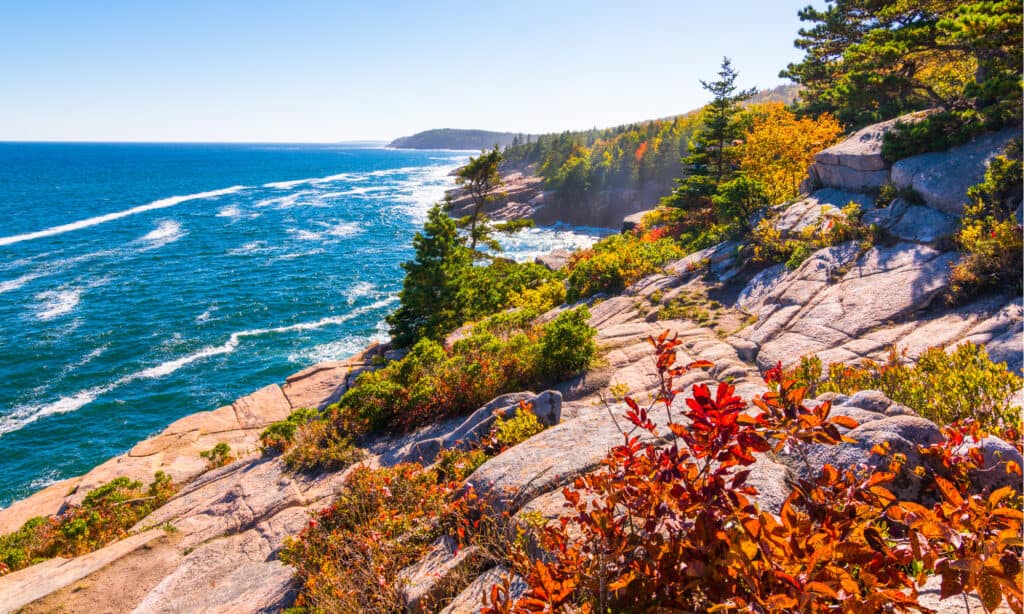
Acadia National Park is well known for its glacier-scoured granite peaks, rocky beaches, and wildlife.
©Eric Urquhart/Shutterstock.com
| Acadia National Park | |
|---|---|
| Location | Maine |
| Size | 49,075 acres |
| Animals to See | Otters, fishers, coyotes, bobcats, porcupines, beaver, foxes, minks, snowshoe hares, and raccoons |
| Attractions to See | Thunder Hole, Jordan Pond, Cadillac Mountain, Sand Beach, Schoodic Peninsula, and Bass Harbor Head Lighthouse |
Acadia National Park is an epic national treasure on the coast of Maine. It’s well known for its glacier-scoured granite peaks, rocky beaches, and wildlife. It’s one of the top 10 most popular national parks in the United States. Around 3.5 million people visit the park every year. To avoid crowds, you need to know some insider information, especially during peak seasons.
September through November is the ideal time to tour Acadia when it’s crowd-free. Visitors enjoy 45 miles of carriage roads, 200 miles of hiking trails, and 27 miles of historic motor roads. In winter, you can also enjoy the park’s serenity under a blanket of snow.
8. Yellowstone National Park
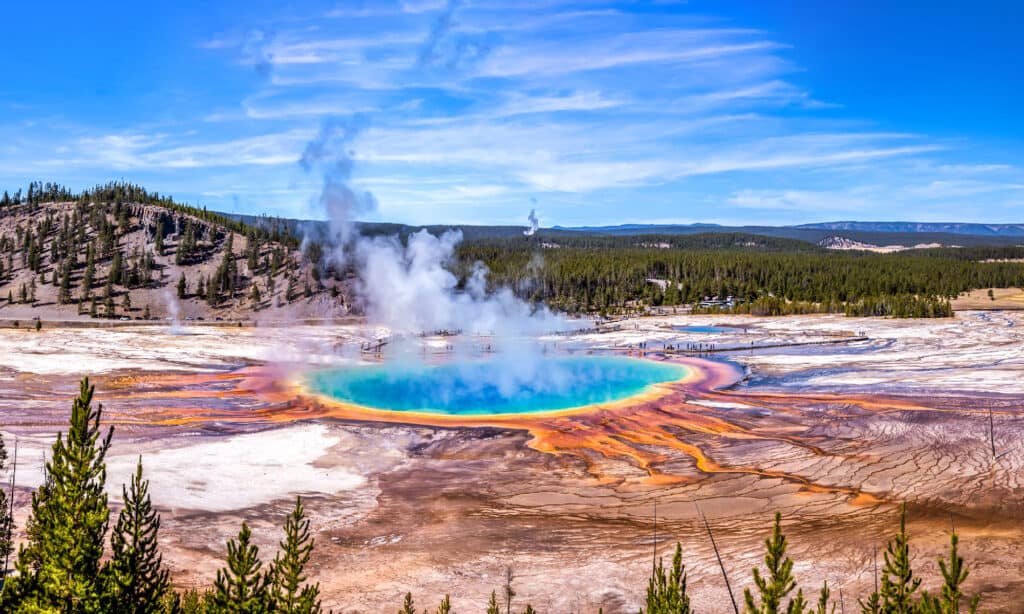
Yellowstone National Park is home to Canada lynx, bears, wolves, moose, foxes, otters, badgers, and herds of bison.
©Lillac/Shutterstock.com
| Yellowstone National Park | |
|---|---|
| Location | Wyoming, Montana, and Idaho |
| Size | 2,219,791 acres |
| Animals to See | Canada lynx, bears, wolves, moose, foxes, otters, badgers, and herds of bisons |
| Attractions to See | Grand Prismatic Spring, Yellowstone Lake, Norris Geyser Basin, Mammoth Hot Springs, and Old Faithful |
Yellowstone National Park offers excellent opportunities to explore gushing geysers, dramatic canyons, lush forests, hot springs, and alpine rivers. It’s also home to numerous species of animals, including bears and wolves.
The park offers the perfect escape from the hustle and bustle of the city. April, September, October, and November are the best months to visit Yellowstone. These off-season months will give you more chances to enjoy thinner crowds and catch a glimpse of local wildlife.
9. Yosemite National Park
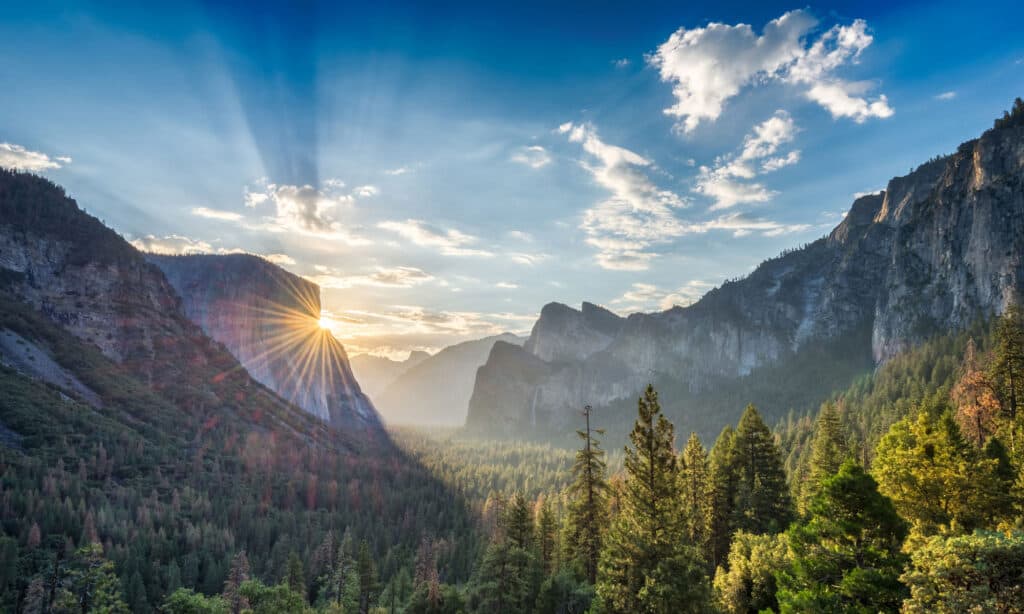
Yosemite National Park is famed for its giant ancient trees, vast wilderness, granite cliffs, meadows, and tunnel views.
©iStock.com/agaliza
| Yosemite National Park | |
|---|---|
| Location | California |
| Size | 759,620 acres |
| Animals to See | Black bear, bighorn sheep, mule deer, bobcat, coyote, mountain lions |
| Attractions to See | Half Dome, El Capitan, Bridalveil Fall, Ansel’s Dam Gallery, Yosemite Museum |
If you’re searching for a real adventure, look no further than Yosemite National Park in California. It’s not just a great valley but an icon of America’s natural beauty. Yosemite is famed for its giant ancient trees, vast wilderness, granite cliffs, meadows, and tunnel views.
You should visit Yosemite if seeing wildlife is at the top of your list since the place is more prominent with less foot traffic. So, you will have a chance to see many different species of animals in their natural habitats.
Yosemite National Park is open throughout the year, but most visitors tour the place between May and October when all activities and roads are accessible. You can visit the site from November to April when it’s less crowded.
10. Indiana Dunes National Park
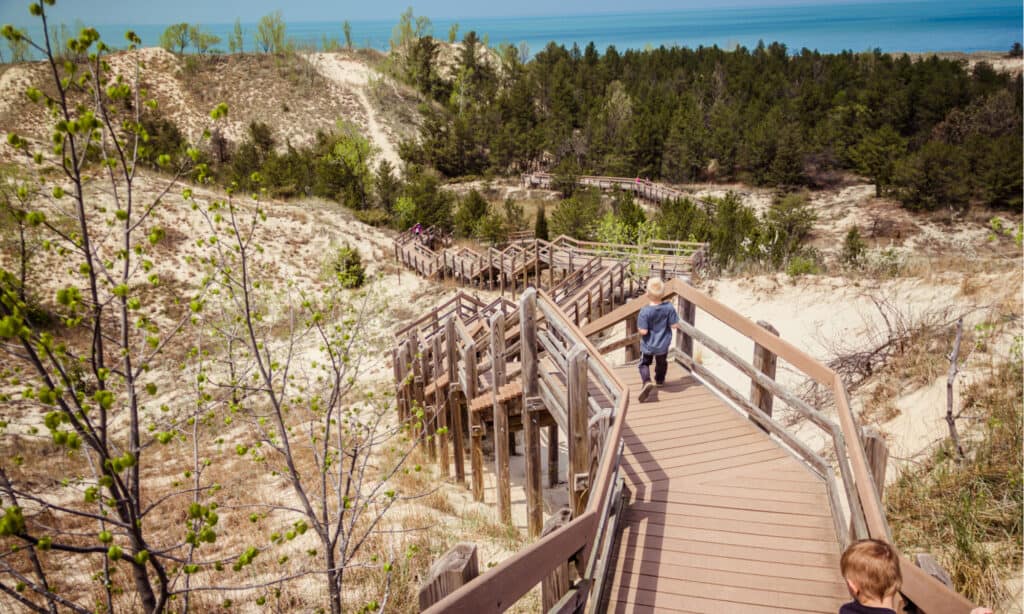
Indiana Dunes National Park features more than 350 bird species and more than 1,100 flowering plants.
©Jon Lauriat/Shutterstock.com
| Indiana Dunes National Park | |
|---|---|
| Location | Indiana |
| Size | 15,349 Acres |
| Animals to See | Wolves, chipmunks, squirrels, and cottontails |
| Attractions to See | Deep River Waterpark, The 3 Dune Challenge, Mount Baldy, and Portage Lakefront & Riverwalk |
Having been designated as the nation’s 61st national park on February 15, 2019, Indiana Dunes National Park is a treasure trove of nature, featuring more than 350 bird species and more than 1,100 flowering plants. The park also has some of the highest unique dunes over the lake.
Are you looking to avoid crowds? Visit the park in the spring and fall when it’s less crowded. There are usually fewer visitors mid-week throughout the year. Explore the Heron Rookery Trail to check out the spring wildflowers, or look for fall colors on the Glenwood Dunes Trail.
Summary of the 10 Most Popular National Parks
| Rank | National Park | Location |
|---|---|---|
| 1 | Great Smoky Mountains National Park | North Carolina and Tennessee |
| 2 | Zion National Park | Southwest Utah |
| 3 | Grand Teton National Park | Wyoming |
| 4 | Rocky Mountain National Park | Colorado |
| 5 | Grand Canyon National Park | Arizona |
| 6 | Glacier National Park | Montana |
| 7 | Acadia National Park | Maine |
| 8 | Yellowstone National Park | Wyoming, Montana, and Idaho |
| 9 | Yosemite National Park | California |
| 10 | Indiana Dunes National Park | Indiana |
The photo featured at the top of this post is © sumikophoto/Shutterstock.com
Thank you for reading! Have some feedback for us? Contact the AZ Animals editorial team.



